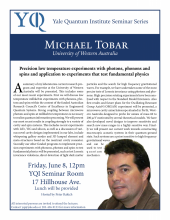Precision low temperature experiments with photons, phonons and spins and application to experiments that test fundamental physics
A summary of my laboratories current research program and expertise at the University of Western Australia will be presented. This includes some of our most recent experiments. First we will discuss low temperature millikelvin experiments with phonons, photons and spins within the context of the funded Australian Research Council’s Centre of Excellence in Engineered Quantum Systems. Strong coupling between microwave photons and spins at millikelvin temperatures is necessary to realise quantum information processing. We will present our most recent results in coupling strongly to a variety of cavity and spin systems. This includes recent experiments with LiFe, YIG and silicon, as well as a discussion of various novel cavity designs implemented in our labs, include whispering gallery modes and 3D lumped element and meta-structures based on the reentrant cavity resonator. Secondly our other funded programs to implement precision experiments with phonons, photons and spins to test fundamental physics will be presented, such as test Lorentz invariance violations, direct detection of light dark matter particles and the search for high frequency gravitational waves. For example, we have undertaken some of the most precise tests of Lorentz invariance using photons and phonons. High precision rotating experiments have been analysed with respect to the Standard Model Extension. Also first results and future plans for the Oscillating Resonant Group AxioN (ORGAN) experiment will be presented, a microwave cavity axion haloscope situated in Perth, Western Australia designed to probe for axions of mass 60 to 200 µeV motivated by several theoretical models. We have also developed novel designs to improve sensitivity and search new mass ranges in a highly sensitive way. Finally we will present our current work towards constructing macroscopic acoustic systems in their quantum ground state. Such systems are a priori sensitive to high frequency gravitational waves and can be used to test quantum mechanics.
